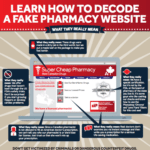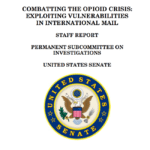Posts Tagged ‘Partnership for Safe Medicines’
ASOP and 40 Patient Organizations Reach Out to Vice President Pence to Put a Stop to #Covidscams
In a letter dated April 9th, the Alliance for Safe Online Pharmacies (ASOP) has requested that the Vice President prioritize evidence-based messaging and focus energies on provable therapies for treating COVID-19. The letter also asks the Vice President to address the “systemic, structural Internet policy problems that enable COVID-19 scams online.”
[...]House Resolution demands open access to WHOIS Results
WHOIS data is searchable registrar information available for all websites on the Internet. It has long been used to trace criminal websites that host counterfeit and illicit drug sales, human trafficking, child pornography, and illicit and copyrighted content, as well as the websites of spammers, denial-of-services and phishing attackers, and other fraudsters.
[...]Drug Importation is Fraught with Peril
As a licensed pharmacist, I’m all too familiar with patients’ difficulties getting medications they need and their physician has prescribed. As baby boomers age, pharmacists see more patients at our counters unable to obtain needed treatments for heart disease, high blood pressure, diabetes, and other chronic illnesses. This issue is now being acknowledged and a healthy debate has begun over possible solutions. But one idea policymakers shouldn’t pursue is opening up our country’s secure drug supply to medicines coming from outside our borders.
[...]Senate Report Highlights Extreme Danger of Illegally Imported Fentanyl from China
The Partnership for Safe Medicines today issued the following statement regarding a new Senate report that highlights the direct harm posed by illegally-imported fentanyl from China…
[...]Partnerka, Counterfeit Drugs and the New Counterfeit Spam
The Partnership for Safe Medicines (PSM) has long reported on the growing issue of pharmaceutical spam advertising—and now SophosLab Canada has taken a closer look at the solicitation of counterfeit products online.
[...]Consumer Protection Group Applauds International Efforts to Combat Illegal Online Pharmacies
The Partnership for Safe Medicines (PSM) issued the following statement regarding the International Internet Week of Action, code named Operation Pangea II, intended to curb illegal actions involving medical products. PSM is a group of organizations and individuals dedicated to protecting consumers from counterfeit medicines.
[...]Interview Spotlight: Building Pharmaceutical Anti-Counterfeiting Programs
Dr. Frances Richmond from the University of Southern California (USC) School of Pharmacy and Lew Kontnik of Amgen are the organizers of the upcoming “Building Pharmaceutical Anti-Counterfeiting Programs” course, which will take place on Nov. 18 at USC.
[...]The new “Spamalot” – Spam Solicitations for Counterfeit Drugs
On October 13, a USA Today article featured a report released from the antivirus company McAfee. They found that 70 percent of spam in September was from websites advertizing “Canadian pharmaceuticals.” Further, the only thing that made it “Canadian” was the word Canadian and the maple leaves on the spammers’ web page. The increase in counterfeit drug spam may be due to the rising fears surrounding H1N1 flu, as well as the intensity around the topic of healthcare costs.
[...]Creating Marketplaces Free from Counterfeit Drugs
On October 12, The Foundation Chirac, a long-time champion of access to safe medicines in African countries, is hosting a meeting in Cotonou, Benin, to discuss the counterfeit drugs that plague African citizens.
[...]Internet Search Engines Promote Illegal Online Pharmacies
The Partnership for Safe Medicines, a group of organizations and individuals dedicated to protecting consumers from counterfeit medicines, issued the following statement regarding recent reports released by LegitScript, an online pharmacy verification service, and KnujOn,an Internet compliance company, which found that 80 to 90 percent of search engine-sponsored advertisements of online drug pharmacies violate federal and state laws, including selling substandard or counterfeit drugs to unsuspecting consumers.
[...]


